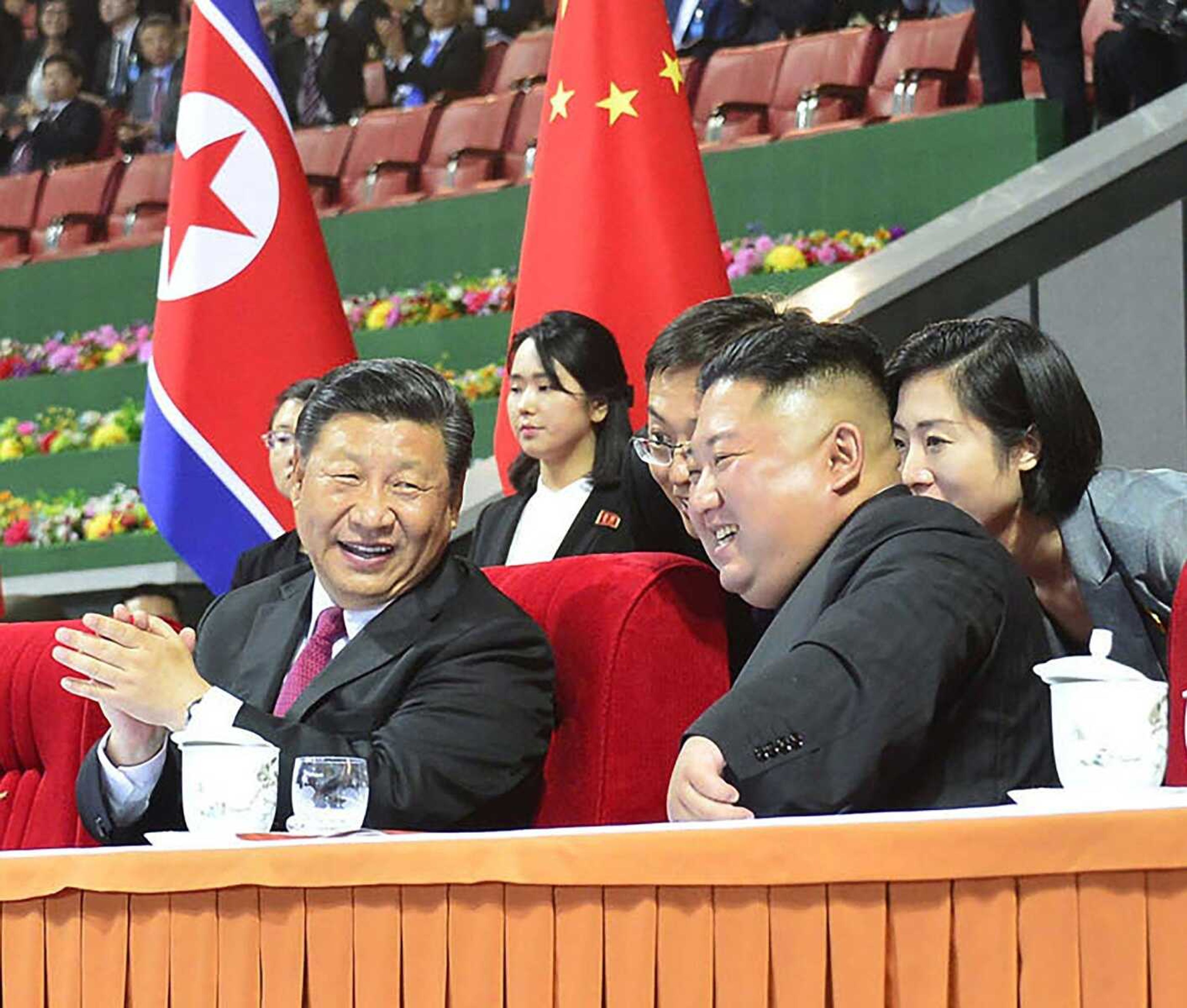China's Xi pushes economic reform at North Korea summit
BEIJING -- Chinese President Xi Jinping offered encouragement for North Korea's focus on economic development in a speech in Pyongyang, turning to a topic Beijing has long pressed with its Communist neighbor amid wider concerns over the North's nuclear weapons program...
BEIJING -- Chinese President Xi Jinping offered encouragement for North Korea's focus on economic development in a speech in Pyongyang, turning to a topic Beijing has long pressed with its Communist neighbor amid wider concerns over the North's nuclear weapons program.
In an address at a banquet Thursday night, Xi noted that the nation under leader Kim Jong Un had "initiated a new strategic line of economic development and improving people's livelihoods, raising socialist construction in the country to a new high tide," according to China's official Xinhua News Agency.
Xi left North Korea early Friday afternoon, Chinese state media reported. An image posted on the mobile app of state broadcaster CCTV showed people waving at his Air China Boeing 747 on the tarmac at the airport in Pyongyang.
Before leaving, Xi, accompanied by Kim and their wives, laid a wreath at a memorial to Chinese soldiers killed in the 1950-53 Korean War. China's intervention in the conflict prevented a rout of North Korean forces by troops from the U.S. and others under United Nations command.
"We will pass down the China-North Korea friendship from generation to generation, consolidate and develop the two countries' socialist cause, better enrich our citizens and advance regional peace, stability, development and prosperity," Xi was quoted as saying.
The North's long-moribund economy has shown some recent improvements, but it remains heavily dependent on aid -- mainly from China -- and food security is a constant concern. China has agreed to U.N. economic sanctions over the North's nuclear and missile programs but is wary of any measures that could push its economy toward collapse, potentially unleashing instability and chaos on its border.
Xi's speech also touched on the nuclear issue, saying all sides agreed to "stick to peace talks so as to make even greater contributions to peace, stability and prosperity in the region and the wider world," Xinhua said.
North Korean state media said Friday that Xi and Kim held broad discussions over the political situation surrounding the Korean Peninsula and reached a shared understanding on the issues they discussed. The Korean Central News Agency report did not give any specifics on the stalled nuclear negotiations between Washington and Pyongyang over disagreements in exchanging sanctions relief for disarmament.
"The supreme leaders ... broadly exchanged their opinions on the political situation of the Korean Peninsula and other serious international and regional issues," KCNA said. They assessed that deepening their relationship was in line with the "mutual interest of the two countries in face of serious and complicated changes in the environment and would be favorable for the region's peace, stability and development," it said.
In South Korea, the presidential Blue House welcomed Xi's visit to North Korea, saying it believes his talks with Kim will help promote peace and stability on the Korean Peninsula.
Kim told Xi on Thursday that he has not received a desired response from Washington and that the U.S. should meet North Korea halfway to "explore resolution plans that accommodate each other's reasonable concerns," according to Chinese state media.
Xi said his government is willing to play a constructive role in the denuclearization of the Korean Peninsula. "The international community expects the U.S. and North Korea to continue to talk and achieve results," CCTV quoted him as saying.
His visit to North Korea was the first by a Chinese president in 14 years.
Xi is expected to meet with President Donald Trump next week in Japan and could pass him a message from Kim about the nuclear negotiations.
Following Thursday's banquet, the leaders and their wives attended a mass performance of music, dance and calisthenics at a packed 110,000-seat stadium.
The spectacle featured gymnasts, dancers and flip card-holding spectators performing in precise unison -- at one point producing a huge image of a waving Chinese flag in the stands, then flipping their cards to show the North Korean flag.
Xi and Kim waved to cheering crowds during the performance, dubbed "Invincible Socialism," according to KCNA. Performing groups sang Chinese favorites and put on what KCNA termed "the peculiar display of Chinese folk dances." The show ended with red fireworks over the May Day Stadium.
Nuclear talks between the U.S. and North Korea broke down after the failed summit between Kim and Trump in February in Vietnam.
The U.S. is demanding that North Korea abandon its nuclear weapons entirely before international sanctions are lifted. North Korea is seeking a step-by-step approach in which moves toward denuclearization are matched by concessions from the U.S., notably a relaxation of the sanctions.
"Over more than a year, the North Korean side has taken many positive measures to avoid escalation of the situation and manage and control the peninsular situation, but it hasn't received an active response from the relevant party," Kim told Xi on Thursday, according to CCTV.
Xi was expected to endorse North Korea's calls for an incremental disarmament process. China is also pushing for a resumption of six-nation disarmament talks it had hosted but which broke down a decade ago.
Associated Press writers Hyung-jin Kim and Kim Tong-hyung in Seoul, South Korea, and researcher Yu Bing in Beijing contributed to this report.
Connect with the Southeast Missourian Newsroom:
For corrections to this story or other insights for the editor, click here. To submit a letter to the editor, click here. To learn about the Southeast Missourian’s AI Policy, click here.










